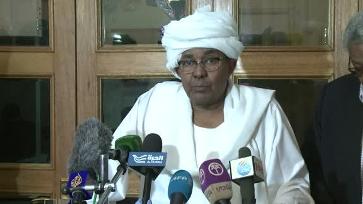Voter turnout in Sudan elections exceeds that of US, UK: official
April 21, 2015 (KHARTOUM) – The chairman of Sudan’s National Electoral Commission (NEC) Mokhtar al-Asam announced that voter turnout figures in last week’s elections has been revised upwards to 42% from 38%.

Last week, Sudan conducted its first general elections after the secession of the south that saw a very low voter turnout amid boycott by major opposition parties and what observers labeled as widespread apathy among eligible voters.
The National Elections Commission (NEC) extended the vote nationwide by an extra day in a bid to boost the turnout.
In an interview with the Sudan News Agency (SUNA) on Tuesday, al-Asam that the numbers are expected to rise thus “exceeding the world average to be higher than those in the United States and Britain”.
He emphasised that the NEC managed the elections with complete independence and integrity in a manner similar to the 2010 elections which were monitored at the time by US-based Carter Center, United Kingdom and Norway.
“This time [we performed] with a higher level of accuracy and integrity,” al-Asam said.
On Tuesday, Sudan’s foreign ministry summoned envoys of the United Kingdom, Norway, United States and the European Union (EU) to protest their joint statement on the elections.
In a statement released yesterday, the three members of the Sudan Troika expressed regret over what they described as failure by the Khartoum government “to create a free, fair and conducive elections environment”.
They said the “outcome of these elections cannot be considered a credible expression of the will of the Sudanese people”.
Sudan’s foreign ministry described the statement as “a blatant interference in the country’s affairs”, accusing them of deliberately ignoring rebels’ shelling of South Kordofan during the elections.
But the NEC chairman underscored that observers from the African Union (AU), the Arab League, China, Russia, Latin America, and local observers vouched for the integrity and impartiality of the process.
He noted that the commission allowed representatives of political parties and candidates to be present polling stations in all stages of the electoral process.
Al-Asam also mentioned that elections were held in a peaceful environment with no incidents of electoral violence.
(ST)
